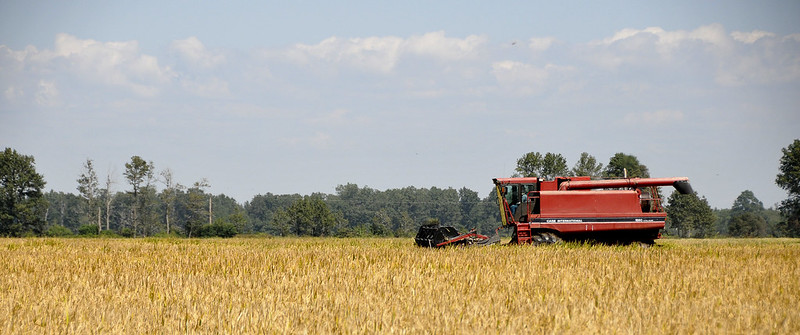March 24, 2020
Arkansas, nation celebrates National Ag Week, National Ag Day
By Ryan McGeeney
U of A System Division of Agriculture
Fast Facts:
- National Ag Day celebrates the efforts of farmers, ranchers, other producers across the country
- Ag production contributes more than $21.2 billion to the state’s economy each year.
(442 words)
LITTLE ROCK — While the people of agriculture are keenly aware of their industry’s role to both global economy and social stability, the COVID-19 pandemic has prompted consumers to realize they shouldn’t take their food and fiber supplies for granted.
Such is the backdrop for National Ag Week, March 22-28, and National Ag Day, which fell on March 24 this year.
The annual event was created by the Agriculture Council of America in 1973. It seeks to highlight the contributions farmers, ranchers and other agricultural producers make on a daily basis to both the food and fiber supplies on which consumers rely.
Although denied a public, in-person celebration by the COVID-19 crisis, Gov. Asa Hutchinson’s proclamation for Arkansas Agricultural Week lives online, extolling the dozens of contributions Arkansas growers make each year.
According to the “Arkansas Agriculture Profile,” compiled by the University of Arkansas System Division of Agriculture, there are about 42,500 farms in Arkansas, covering about 13.9 million acres of land. Additionally, the state hosts almost 19 million acres of trees, with forestry accounting for the largest area of agriculture and about 56 percent of the landmass in Arkansas.
Agricultural production contributes more than $21.2 billion to the state’s economy each year, accounting for about one out of every six dollars generated by the state, as well as one in every six Arkansas jobs. The Ag Profile can be found here: https://uada.edu/docs/2019-AR-Ag-profile.pdf.
Dr. Vic Ford, associate director of agriculture and natural resources for the Division of Agriculture, said agriculture was integral to the stability of Arkansas and the nation on several levels.
“Agriculture is the state’s No. 1 industry by revenue and employment,” Ford said. “Arkansas agriculture not only feeds the world, but also provides abundant local foods for its citizens.
“During these trying times, farmers are social distancing on tractors and other equipment to ensure that food, fiber and energy are readily available and affordable,” he said. “In the face of rising input costs and declining farm, ranch, and forest income, it is difficult to determine how to make a profit and keep the enterprise solvent.”
Ford also said the Division of Agriculture will continue supporting growers in the state through ongoing research and outreach efforts.
“The Division of Agriculture’s mission is to provide research-based information to maximize the value of the land including financial, social, and environmental values,” he said. “Our agriculture enterprises focus on farm, ranch, forest, and environmental sustainability that will allow the continued operation for future generations.”
To learn about extension programs in Arkansas, contact your local Cooperative Extension Service agent or visit www.uaex.uada.edu.
About the Division of Agriculture
The University of Arkansas System Division of Agriculture’s mission is to strengthen agriculture, communities, and families by connecting trusted research to the adoption of best practices. Through the Agricultural Experiment Station and the Cooperative Extension Service, the Division of Agriculture conducts research and extension work within the nation’s historic land grant education system.
The Division of Agriculture is one of 20 entities within the University of Arkansas System. It has offices in all 75 counties in Arkansas and faculty on five system campuses.
Pursuant to 7 CFR § 15.3, the University of Arkansas System Division of Agriculture offers all its Extension and Research programs and services (including employment) without regard to race, color, sex, national origin, religion, age, disability, marital or veteran status, genetic information, sexual preference, pregnancy or any other legally protected status, and is an equal opportunity institution.
# # #
Media contact:
Ryan McGeeney
Communications Services
University of Arkansas System Division of Agriculture
Cooperative Extension Service
(501) 671-2120
rmcgeeney@uada.edu
